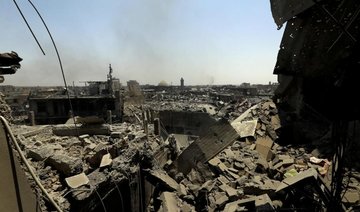BAGHDAD: Former Iraqi Prime Minister Nouri Maliki will participate in the forthcoming parliamentary election, but refuses to do so as part of a joint electoral list with his successor Haider Abadi, senior leaders of the Islamic Dawa Party told Arab News.
Both Abadi and Maliki belong to the party. The current prime minister replaced his predecessor in September 2014 following widespread opposition to Maliki’s desire for a third term. Tensions between the two have persisted ever since.
So far, 205 political parties and 12 registered alliances will participate in the election, which is due to take place on May 12, the Independent High Electoral Commission told Arab News.
Ali Alaq, a Dawa leader, told Arab News that the party “wants to participate in the election in one electoral list.”
This “will preserve the interests of the party and won’t disperse the (electoral) votes, but Maliki has another opinion,” Alaq said.
But Maliki’s political adviser Abbas Mossowie told Arab News: “Participating in two electoral lists, one headed by Maliki and the other by Abadi, has been discussed during recent party meetings.”
Mossowie added: “The final decision hasn’t been made yet, but the majority (of the party) supports having two lists. Maliki prefers to run the election in two lists.”
The rebuilding of the security establishment, the retaking of territory lost to Daesh and the Kurds, and increased international and regional support for Abadi’s government, contributed to his nomination as head of Dawa’s electoral list, party leaders told Arab News.
“Abadi is more worthy than anyone else to head the list. Our field research suggests he has a great chance at re-election as head of the next government,” a Dawa leader told Arab News on condition of anonymity.
“There’s almost an international, Arab and popular consensus on Abadi. He deserves to win another term to finish his work on the economy, fight corruption and rebuild liberated areas.”
Maliki believes that Abadi, Dawa and his Shiite rivals betrayed him when they opposed him having a third term even though he gained the most votes in the 2014 election.
Since then, he has sought to prove that he is still a major player in Iraqi politics and a strong contender for the prime minister’s office.
Maliki is seeking the votes of pro-Iran paramilitary Shiite troops who fought Daesh, as he was the one who gave these forces government support.
He says Abadi is loyal to the US, so his re-election represents a danger to the future of these paramilitaries and Iranian interests in Iraq.
Hadi Al-Amairi, the head of Badr Organization, one of the largest and the most organized Shiite armed factions within the Popular Mobilization Units (PMU), announced on Friday that he would not run for election and would supervise the formation of a new electoral list to include all political figures supportive of the PMU. Al-Amairi’s Friday announcement is likely to undermine Maliki’s efforts to get the votes of PMU fighters.
“Nothing is clear so far and alliances are yet to be finalized,” Mossowie said.
“The withdrawal of Badr and several other blocs does not mean they have become Maliki’s rivals. This is an electoral arrangement adopted by many blocs to know their electoral size (the number of votes that they will get).”
Maliki rejects joint electoral list with Abadi: Dawa Party
Maliki rejects joint electoral list with Abadi: Dawa Party














